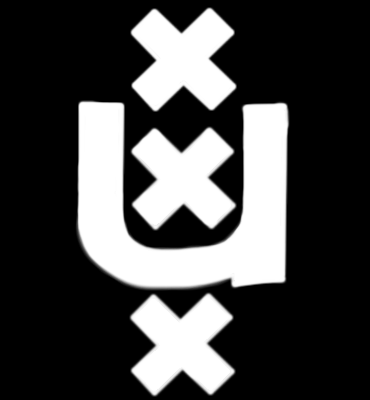Information Theory
Master of Logic
Teaching assistant: Cuong Hoang (hoangcuong2011 at gmail.com)
Content of the course
Information theory was developed by Claude E. Shannon in the 1950s to investigate the fundamental limits on signal-processing operations such as compressing data and on reliably storing and communicating data. These tasks have turned out to be fundamental for all of computer science.In this course, we quickly review the basics of probability theory and introduce concepts such as (conditional) Shannon entropy, mutual information and Renyi entropy. Then, we prove Shannon's theorems about data compression and channel coding. Later in the course, we also cover some aspects of information-theoretic security such as the concept of randomness extraction and privacy amplification.
Intended Learning Outcomes
Now, at the end of the course, you are able to- Define Shannon entropy and Mutual Information and compute these quantities on examples.
- Work with joint discrete random variables (conditioning, Bayes' rule)
- Define basic discrete probability distributions (Bernoulli, Binomial, Geometric) and compute their expected value and variance
- State Jensen's inequality for convex and concave functions and use it in proofs
- Use entropy diagrams to read off and find new relations between entropic quantities
- Prove Shannon's theorem about perfectly secure encryption (e.g. by using an entropy diagram)
- Define typical and jointly typical sets, prove properties about their size and probability mass and know how they are used in source coding and channel coding
- Use Kraft's inequality e.g. to check if a prefix-free code exists for given codeword lengths
- Compute a d-ary Huffman code
- Describe how much a given source can be compressed and give a way to do it
- Prove properties about Arithmetic Codes
- Find the confusability graph of a given channel, and find channels for a given confusability graph
- Compute the independence number and (zero-error) Shannon capacity of a given confusability graph
- Compute the capacity and maximizing input distribution of a given channel
- Define basic channels (binary symmetric, erasure channel)
- State Shannon's noisy channel-coding theorem and and understand the key ingredients of the proof
- Grasp definitions of types of entropy different than Shannon entropy
Course website
Updated information about the course can be found on https://staff.science.uva.nl/c.schaffner/courses/inftheory/2014/Study Material
The material will be presented in black-boards lectures. The following are good references:- [CF] Ronald Cramer, Serge Fehr: The Mathematical Theory of Information, and Applications, lecture notes, Version 2.0
- [CT] Thomas M. Cover, Joy A. Thomas. Elements of information theory, 2nd Edition. New York: Wiley-Interscience, 2006. ISBN 0-471-24195-4.
- [MacKay] David J. C. MacKay. Information Theory, Inference, and Learning Algorithms. Cambridge: Cambridge University Press, 2003. ISBN 0-521-64298-1
Lectures and Exercise sessions (2 x 45min each)
please check Datanose for the definite times and locations.Lectures (Hoorcollege)
Times: Tuesdays, 11-13, location: Science Park G0.05
Thursdays, 11-13, location: check Datanose
starting 4 February 2013
Exercises (Werkcollege)
Time: Fridays 9-11, location: check Datanose
first exercises: 7 February 2013
Homework, exam, and grading
This is a 6 ECTS course, which comes to roughly 20 hours of work per week.There will be homework exercises every week to be handed in one week later. The answers should be in English. Feel free to use LaTeX, here is a template to get you started, but readable handwritten solutions are fine, too. Cooperation while solving the exercises is allowed and encouraged, but everyone has to hand in their own solution set in their own words.
There will be a final written exam on Friday, March 28, 2014, from 9:00-12:00 in SP, G2.02. The exam is open-book, meaning that you can bring the study material [CF], [CT], [MacKay] mentioned above as well as any notes you made, but no electronic devices are allowed.
The final grade for the course consists by 1/2 of the average homework grade (ignoring the worst grade) and 1/2 of the grade obtained at the final exam.
Preliminary course schedule Spring 2014
| Tue, 4 Feb 2014 |
Overview of the course, Probability Theory Section 2.1 of [CF] Slides |
| Thu, 6 Feb 2014 |
Shannon Entropy, Jensen's inequality, Properties of Shannon entropy Sections 3.1-3.3 of [CF] Slides Homework #1 (updated)6 Feb 14: There was a typo in the definition of the random variable Z in homework exercise 4, it is corrected now. |
| Tue, 11 Feb 2014 |
Chain Rule, Mutual Information, Entropy Diagrams, Markov Chains Sections 3.3, 3.4 of [CF], Sections 2.5, 2.8 of [CT] |
| Thu, 13 Feb 2014 |
Data-Processing Inequality, Sufficient Statistics,Fano's inequality, Perfectly Secure Encryption: One-time pad Sections 2.8-2.10 of [CT], Section 4 of [CF] Homework #2 (updated) Homework Latex Template (updated) |
| Tue, 18 Feb 2014 |
Perfectly Secure Encryption: Shannon's theorem. Data compression / Source coding, Asymptotic Equipartition Property Section 4 of [CF], Section 3.1 of [CT] Entropy of Alice in Wonderland Hex Editor with statistics Slides |
| Thu, 20 Feb 2014 |
Data Compression: Typical set, Source-coding Theorem, high-probability set, symbol codes Section 3.2+3.3 of [CT] Homework #3 Table for #3, Exercise 3 Entropy Diagram Latex Template (thanks to Yfke!)25 Feb 14: Added PDF file of the probability table for ex 3. |
| Tue, 25 Feb 2014 |
Data Compression: symbol codes, properties, source-coding theorem reloaded, Kraft's inequality, Huffman codes Section 5 of [CF], Chapter 5 of [CT], Chapter 5 of [MacKay] Slides |
| Thu, 27 Feb 2014 |
Optimality of Huffman Codes, Arithmetic Codes Section 5.4+5.5 of [CF], Section 6.2 of [MacKay] Homework #4 |
| Tue, 4 Mar 2014 |
Guest lecture by Teresa Piovesan Zero-error information theory Pages 4+5 of this survey paper |
| Thu, 6 Mar 2014 |
Guest lecture by Teresa Piovesan Zero-error information theory Homework #5 (updated, thanks to Teresa!)Clarification added in Exercise 2(f). |
| Tue, 11 Mar 2014 |
Noisy-channel coding: capacity, set-up and proof of converse Sections 7.1, 7.4, 7.5, 7.9, 7.12 of [CT] |
| Thu, 13 Mar 2014 |
Shannon's theorem about noisy-channel coding Sections 7.6, 7.7 of [CT], Chapter 10 of [MacKay] Slides Homework #6 |
| Tue, 18 Mar 2014 |
Source-channel Separation, Error-correcting codes Section 7.13 of [CT], Chapter 1 of [MacKay] Slides |
| Thu, 20 Mar 2014 |
No more lecture, but exercise session instead of Fri, 21 March Homework #7 |
| Fri, 21 Mar 2014 |
No Exercise Session |
| Tue, 25 Mar 2014 |
No Lecture (exam week) |
| Thu, 27 Mar 2014 |
No Lecture (exam week) |
| Fri, 28 Mar 2014 | Final Written exam 9:00-12:00 in SP, G2.02 |

